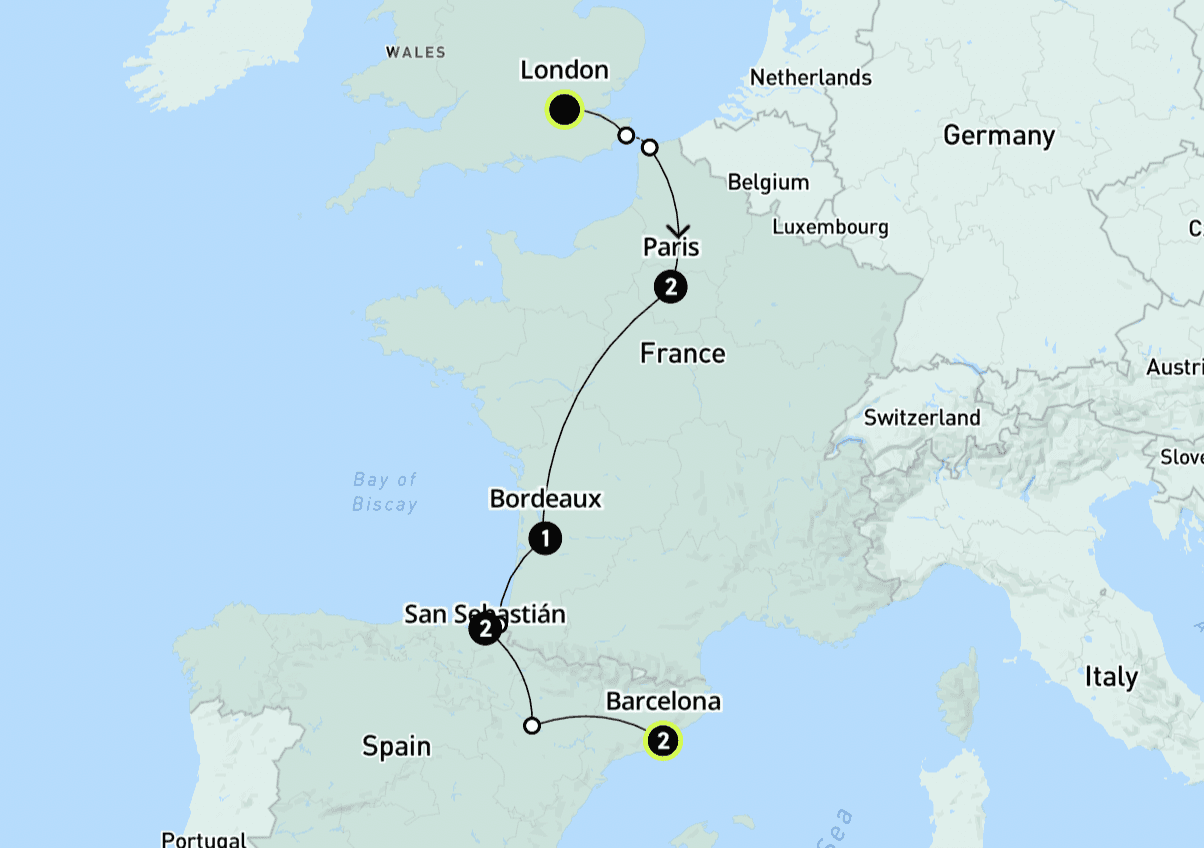Worried about the unexpected while traveling? This Spain travel insurance guide has everything you need to protect your dream journey. From health coverage to lost luggage and delays, I’ll walk you through how to stay safe, smart, and totally stress-free while exploring Spain.

Hey there, fellow wanderer! Planning a trip to Spain? I'm betting you're already daydreaming about sipping sangria in Barcelona, wandering through the Alhambra in Granada, or soaking up rays on the Costa del Sol. I know I was! But between booking flights and researching tapas bars, there's one crucial thing many travelers overlook: travel insurance.
I learned this lesson the hard way. During my second trip to Madrid, I twisted my ankle on those charming but treacherous cobblestone streets. What followed was a crash course in Spanish healthcare and a hefty bill that could have been avoided with proper insurance. That's why I'm sharing everything I've learned about Spain travel insurance since then.
In this guide, you'll discover exactly what coverage you need, how to choose the right policy, regional considerations for different parts of Spain, and insider tips that could save you thousands of euros. Plus, I'll break down the real costs and benefits in plain English – no insurance jargon, I promise!
Ready to protect your Spanish adventure? Let's dive in!
Why Do You Need Travel Insurance for Spain?
"But Spain is a developed country with good healthcare!" I hear you say. And you're right! But that doesn't mean you should skip insurance. Here's why:
Legal & Visa Requirements
If you're traveling from outside the EU and need a Schengen visa to visit Spain, guess what? Travel insurance isn't just recommended—it's mandatory. You'll need coverage of at least €30,000 for medical emergencies, repatriation, and it must be valid for your entire stay.
Even if you don't need a visa (looking at you, fellow Americans, Canadians, and Brits), having insurance is still incredibly smart. Spain doesn't explicitly require non-visa visitors to have insurance, but without it, you're taking a pretty big gamble.
My friend Jake thought he'd save €50 by skipping insurance for his week in Barcelona. Then he got his camera stolen on Las Ramblas. That €50 "savings" turned into a €900 loss. Not exactly the souvenir he was hoping for!
Healthcare Costs & EHIC/GHIC Limitations
"But I have an EHIC/GHIC card!" Great if you're an EU citizen or a UK resident! These cards give you access to state healthcare in Spain at the same cost as locals. But—and this is a big but—they have serious limitations:
They don't cover private healthcare (which you might need if state facilities are far away)
They won't fly you home if you're seriously ill
They don't cover lost luggage, cancellations, or theft
Mountain rescues? Nope, not covered
I met a British couple in Valencia who thought their GHIC cards were all they needed. When the husband needed an emergency dental procedure not covered by the card, they paid €400 out of pocket. A comprehensive insurance policy would have cost about €60 for their two-week trip.
Protection Against Trip Disruptions
Let's talk about the unexpected. Flights get canceled. Luggage disappears. Family emergencies happen back home.
Last summer, airline strikes affected thousands of flights to Spain. My neighbor had to cancel her trip to Seville when her mom got sick. My own flight to Barcelona was delayed by 12 hours, costing me a night's hotel stay.
Good travel insurance would have covered all these scenarios. Without it? You're often left holding the bill, frantically calling customer service, or spending the first day of your vacation shopping for new clothes.
What Does Spain Travel Insurance Cover?
Now that we know why you need insurance, let's break down what a good policy actually covers:
Medical Emergencies & Hospitalization
This is the big one. Medical coverage typically includes:
Emergency room visits
Hospital stays
Surgeries
Medications
Doctor visits
Ambulance transportation
Look for policies with at least €30,000 in coverage (Schengen requirement), though I personally recommend at least €100,000 for peace of mind. Medical care in Spain is excellent but not cheap for foreigners without proper coverage.
When my cousin broke her wrist after falling off a bike in Mallorca, her insurance covered the €2,800 hospital bill without any hassle. The insurer even arranged an English-speaking doctor. Now that's what I call vacation rescue!
Trip Cancellation & Interruption
Life happens, and sometimes it happens right before or during your dream vacation. Good policies will reimburse you for non-refundable expenses if you need to cancel or cut your trip short for covered reasons like:
Illness or injury (yours or a family member's)
Death in the family
Natural disasters
Airline bankruptcy
Job loss
Jury duty
My own trip to Barcelona had to be cut short when my dad had a health scare back home. My insurance reimbursed me for the unused hotel nights and the last-minute flight change that cost nearly €300.
Lost/Delayed Baggage & Personal Belongings
This coverage is a lifesaver when:
Your luggage decides to vacation in Portugal while you're in Spain
Someone swipes your phone while you're mesmerized by Gaudí's architecture
Your camera takes a swim in the Mediterranean
Most policies offer between €1,000-€3,000 for lost luggage and personal items. There's usually a per-item limit too (often around €300), so if you're bringing expensive gear, look for policies with higher limits or specific gadget coverage.
Pro tip: Keep receipts for any emergency purchases you make while waiting for delayed luggage—these are often reimbursable!
Emergency Evacuation & Repatriation
This is the coverage you hope you never need but will be eternally grateful for if you do. It pays for:
Medical evacuation to the nearest adequate facility
Transportation home if medically necessary
Repatriation of remains in the worst-case scenario
These services can cost tens of thousands of euros without insurance. When a hiker I met got seriously injured in the Picos de Europa mountains, her evacuation by helicopter and medical flight home would have cost €25,000 without insurance.
COVID-19 & Pandemic-Related Coverage
Since the pandemic, this has become an essential consideration. Many policies now include:
Treatment if you catch COVID-19 in Spain
Cancellation coverage if you test positive before your trip
Extended accommodation costs if you need to quarantine
Just a heads up—coverage varies widely between insurers. Some treat COVID-19 like any other illness, while others have specific exclusions or limits. Always, always read the fine print here!
What's Not Covered by Spain Travel Insurance?
Just as important as knowing what's covered is understanding what's not. Here are the typical exclusions:
Pre-Existing Conditions (Unless Declared)
Most standard policies won't cover medical issues related to conditions you already had before buying insurance. This includes things like:
Chronic illnesses
Recent surgeries
Ongoing treatments
Pregnancy beyond a certain week
But don't panic! Many insurers will cover pre-existing conditions if you declare them in advance and possibly pay a higher premium. My aunt with diabetes gets coverage every time she travels to Spain—she just makes sure to declare her condition and carry a doctor's note about her medications.
Extreme Sports & High-Risk Activities
Planning to run with the bulls in Pamplona? Go canyoning in Sierra de Guara? Standard policies probably won't cover injuries from these activities.
Activities commonly excluded include:
Skydiving
Bungee jumping
Rock climbing
Scuba diving below certain depths
Motorbike riding (sometimes)
If adventure is on your agenda, look for policies with specific adventure sports add-ons or specialized adventure travel insurance.
My buddy learned this lesson in Lanzarote when his regular insurance wouldn't cover the dislocated shoulder he got while surfing. The hospital bill? €1,400 out of pocket.
Alcohol/Drug-Related Incidents
Let's be real—Spain has amazing nightlife and delicious wine flows freely. But if you're injured or lose belongings while intoxicated, your claim will likely be denied.
Insurance companies aren't trying to ruin your fun, but they won't cover incidents where your judgment was seriously impaired. One traveler I met in Ibiza had his claim for a broken arm rejected because hospital records showed his blood alcohol level was three times the legal driving limit.
How to Choose the Best Spain Travel Insurance
With so many options out there, finding the right policy can feel overwhelming. Let's break it down:
Single Trip vs. Annual Multi-Trip Policies
If Spain is your only international trip this year, a single-trip policy makes sense. But if you're planning multiple international adventures, an annual multi-trip policy could save you money and hassle.
I switched to an annual policy three years ago when I realized I was taking at least four international trips yearly. It's saved me about €150 per year and hours of time not filling out the same forms repeatedly.
Most annual policies limit the length of each trip (typically 30-90 days), so check these details if you're planning an extended stay in Spain.
Coverage Limits & Deductibles
Higher coverage limits mean better protection but higher premiums. Consider your personal risk tolerance and budget when choosing limits.
Key limits to check:
Medical emergency coverage (I recommend at least €100,000)
Evacuation coverage (at least €50,000)
Trip cancellation (should cover your non-refundable trip costs)
Baggage loss (enough to replace your belongings)
Deductibles work like in other insurance—the higher the deductible, the lower your premium. I usually go with a €100 deductible as a happy medium.
Special Considerations (Families, Seniors, Digital Nomads)
Your specific situation matters when choosing insurance:
Families: Look for policies where kids are covered for free (many cover children under 18 at no extra cost). Family policies often offer better value than individual ones.
Seniors: If you're over 65, premiums typically increase, and you might face more restrictions for pre-existing conditions. Some specialized senior travel policies offer better terms for older travelers.
Digital Nomads: If you're working remotely from Spain, standard travel insurance might not be enough. Consider policies specifically designed for long-term travelers that include coverage for your work equipment and longer coverage periods.
I have an aunt who's 72 and visits her daughter in Malaga every year. She pays about 60% more than I do for similar coverage, but she found a senior-specific policy that covers her heart condition without excessive surcharges.
Gadget & Electronics Coverage
Standard policies usually have low per-item limits that won't cover expensive laptops, cameras, or phones. If you're bringing valuable electronics, consider:
Policies with higher per-item limits
Specific gadget add-ons
Separate insurance for very expensive items
When my camera got stolen in Barcelona (still bitter about that!), my regular policy only covered €300 of my €1,200 camera. Now I always get additional gadget coverage.
Adventure & Water Sports Add-Ons
If your Spanish vacation involves adventure, look into add-ons that cover:
Water sports (great for coastal areas)
Winter sports (essential for Sierra Nevada skiing)
Hiking and trekking (for national parks)
Mountain biking
Scuba diving
These add-ons usually don't cost much—maybe €10-30 extra—but they prevent massive out-of-pocket expenses if something goes wrong during your adventures.
Regional Considerations in Spain
Spain is incredibly diverse, and different regions present different risks and considerations:
Canary Islands (Tenerife, Lanzarote)
The Canaries technically belong to Spain but sit off the coast of Africa. This location matters for insurance because:
You're further from mainland medical facilities
Medical evacuation costs more from these remote islands
Adventure activities like volcano hiking, surfing, and diving are popular
When I visited Mount Teide in Tenerife, I made sure my policy covered hiking at high altitudes (3,700m). The islands' remoteness also made me splurge on higher medical evacuation limits.
Weather can change quickly in the Canaries, affecting flights and ferries. Good trip delay coverage is essential here.
Balearic Islands (Ibiza, Majorca)
The Balearics bring their own considerations:
Nightlife-related incidents are common, especially in Ibiza
Water sports are popular, requiring specific coverage
Peak season sees overcrowded hospitals with long waits
My friend Emma sprained her ankle dancing in an Ibiza club and spent 4 hours in the local hospital's waiting room during high season. Her insurance eventually covered the €350 treatment, but the experience made her wish she'd opted for a policy with private hospital access.
For Majorca, many travelers rent scooters or cars to explore the island. Make sure your policy covers these vehicles!
Mainland Spain (Barcelona, Madrid, Andalusia)
Mainland considerations include:
Pickpocketing and theft (especially in Barcelona and Madrid)
Varied activities from city sightseeing to beach visits to mountain hiking
Regional differences in healthcare quality (urban areas typically have better facilities)
Barcelona consistently ranks among Europe's pickpocketing capitals. When my wallet disappeared on the metro, my insurance replaced my cash (up to the policy limit) and covered the emergency card replacements.
If you're planning to explore rural areas like the white villages of Andalusia, check that your policy covers medical transport from remote locations.
Driving & Transportation Risks in Spain
Getting around Spain presents its own set of insurance considerations:
Car Rental Insurance Requirements
If you're renting a car in Spain, your travel insurance likely won't cover vehicle damage—you'll need separate car rental insurance for that.
Options include:
Rental company's collision damage waiver (CDW)
Coverage through your credit card (check limitations!)
Third-party car rental insurance (often cheaper than rental companies' offerings)
Don't assume your regular travel insurance covers rental cars. It typically only covers medical costs from accidents, not vehicle damage.
When I rented a car in Andalusia, my credit card provided primary coverage, saving me €15/day on the rental company's insurance. Just make sure to check your card's policy before declining the rental company's coverage.
Public Transport & Ferries
Spain has excellent public transportation, but things can go wrong:
Train strikes (not uncommon)
Ferry cancellations due to weather (especially to/from islands)
Theft on crowded public transport
Good travel insurance should cover expenses from major transport disruptions. When my ferry from Barcelona to Mallorca was canceled due to high winds, insurance covered my unplanned hotel night and rebooking fees.
Healthcare in Spain for Tourists
Spain's healthcare system ranks among the world's best, but navigating it as a tourist requires knowledge:
Public vs. Private Healthcare
Spain has both public and private healthcare systems:
Public healthcare:
High quality but can have long wait times
Covered by EHIC/GHIC for eligible travelers
Often has fewer English-speaking staff
May involve bureaucracy
Private healthcare:
Shorter wait times
More likely to have English-speaking staff
More comfortable facilities
Higher costs (but covered by good insurance)
When I needed antibiotics for a nasty ear infection in Seville, I opted for a private clinic. The €90 consultation was fully reimbursed by my insurance, and I was in and out in 30 minutes with medication in hand.
EHIC/GHIC Card Validity
European Health Insurance Cards (EHIC) or UK Global Health Insurance Cards (GHIC) are valuable but limited:
They only work for EU citizens/UK residents
They only cover state healthcare, not private
They don't cover repatriation or non-medical expenses
They may still require partial payments
Think of these cards as a backup, not a replacement for comprehensive travel insurance.
Pharmacies & Emergency Numbers
Spain's pharmacies (farmacias) are identified by green crosses and can handle minor issues without a doctor's visit. Pharmacists are well-trained and many speak English in tourist areas.
Essential emergency numbers:
General Emergency: 112
Medical Emergency: 061
Police: 091
Pro tip: Many travel insurance providers have their own 24/7 emergency assistance numbers. Save this in your phone before traveling—they can direct you to appropriate facilities and start the claims process immediately.
Final Tips Before You Buy Spain Travel Insurance
Before hitting that "purchase" button, here are my hard-earned final tips:
Compare multiple providers
Don't go with the first policy you find. Use comparison sites to evaluate at least 3-4 options. Besides price, compare coverage limits, exclusions, and customer reviews.
I've found that the cheapest policies often have the most exclusions or highest deductibles. Mid-range policies usually offer the best balance of cost and coverage.
Read policy exclusions carefully
The devil is in the details—especially the fine print about:
Activities not covered
Claim documentation requirements
Coverage limits and sub-limits
Pre-existing condition rules
Notification requirements (many policies require you to inform them within 24-48 hours of an incident)
I once missed out on reimbursement for a minor medical claim because I didn't report it within the required 48 hours. Lesson learned!
Keep emergency contacts handy
Before departing, create a document with:
Your policy number
24/7 emergency assistance number
Spanish emergency numbers
Your accommodation details
Embassy contact information
Share this with family back home and keep a copy in your phone AND a printed version in your wallet (in case your phone is lost or stolen).
I store mine in my phone's notes app, as a downloaded PDF, and as a photo in my camera roll. Overkill? Maybe, but it saved me when I needed medical help in Toledo and couldn't remember my policy details.
Spain is a country that captured my heart years ago with its vibrant culture, breathtaking landscapes, and incredible food. Having the right travel insurance has allowed me to explore it fully—from the peaks of the Pyrenees to the beaches of Andalusia—without constant worry about what might go wrong.
Remember, the best travel insurance is the one you hope never to use but are incredibly grateful for when you need it. A few minutes of research and a small percentage of your travel budget can save you thousands of euros and countless headaches.
Have you had experiences with travel insurance in Spain? Questions about specific coverage? Drop a comment below—I'd love to hear from you and help make your Spanish adventure as worry-free as possible!
¡Buen viaje! (Safe travels!)
FAQS Travel to Paradiso
Recent Posts



























